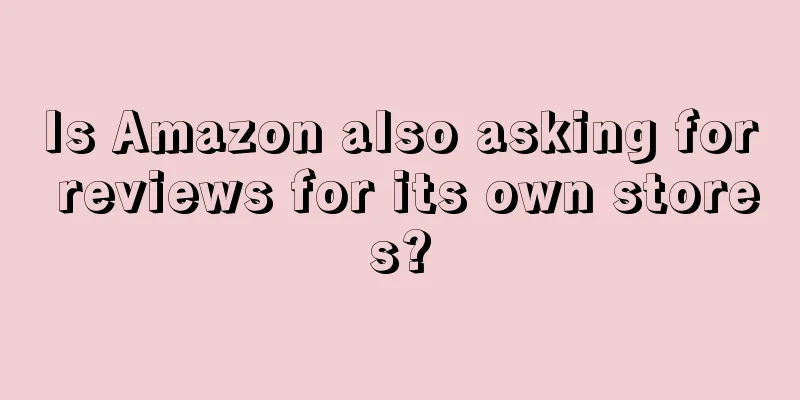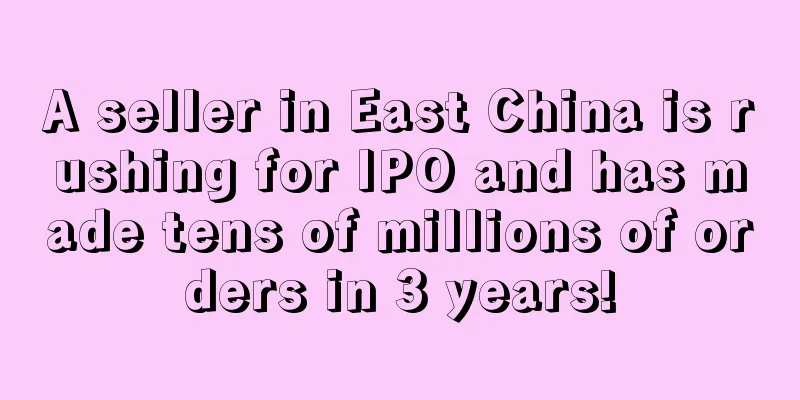Is Amazon also asking for reviews for its own stores?

|
In 2021, many sellers are still haunted by the Amazon "account ban wave" caused by violations such as false reviews. A wave of account bans shook the cross-border circle, causing many big sellers to fall from grace and small and medium-sized sellers to leave the market in disgrace.
However, recently, it was revealed that Amazon’s own brand openly asked sellers for reviews.
Amazon's self-operated business was exposed for openly asking for reviews
Recently, there have been media reports that Amazon openly asks for positive reviews for its own products.
According to the cards suspected of soliciting positive reviews shown by the media, it can be found that they are very similar to the review request cards of most sellers who were previously banned by Amazon for soliciting reviews.
The first line of the card thanked the consumer for purchasing Amazon's own-brand product, and the second line then asked the consumer to leave a review for the product.
A very conspicuous QR code is presented in the middle of the card. Consumers only need to scan the QR code to open the thankyou.amazon.com page, select a site to log in, and then they can evaluate the product.
Because the editor did not make any purchase, after logging in, Amazon popped up a prompt stating that a review could not be left.
In addition to English, there is also French text below the QR code on the card.
At the end of the card, a part is separated by orange, using both English and French to remind consumers to pay attention to Amazon's other self-operated brands - "Other Amazon Brands to expore" , followed by GOODTHREADS, amazon essentials, Stone&Beam, Presto! and Amazon basics.
In fact, the card does not mention words such as "good reviews" or "cash back for reviews". According to Amazon's Seller Code of Conduct, sellers can take a neutral attitude and request buyers to provide reviews . However, as for the method of request, Amazon also stipulates that it can only be sent through the buyer and seller messaging service on the platform.
Some sellers said this is contradictory. " Once sensitive words such as review are involved in the communication on the platform, it is easy to be scanned , but it is said that communication can only be carried out through the platform. We put a small card, no matter how neutral it is, it will be considered a violation. "
In addition, the QR code on the review request card operated by Amazon also provided review links and promoted other brands. "Once exposed, we, the third-party sellers, will be judged to be fraudulent and damage the legitimate interests of other sellers, buyers or Amazon . "
One seller said angrily, "Amazon's self-operated business is based on all the rules of the Amazon platform. All its operations will be judged as violations, fined, and closed down by sellers, but it is doing it peacefully."
“After working for Amazon for so many years, aren’t you used to its operation of being both a referee and an athlete?”
In fact, Amazon’s own products have not taken the lead in complying with many of the rules it has set.
Plagiarism, bundling gift card links in listings, Amazon's own business repeatedly violates the rules?
Amazon has very strict requirements when it comes to copyright and originality, and countless sellers have had their stores closed and their funds frozen due to infringement.
However, Amazon's own business has been exposed for plagiarism many times. Just last year, CNBC also reported that Amazon plagiarized the original products of small and medium-sized enterprises .
Peak Design , a supplier of camera bags and accessories , sells its products through Amazon, but its most popular item, the Everyday Sling Bag, is being sold by Amazon. Basics plagiarism, the product name and appearance are almost identical .
Amazon has been repeatedly accused of abusing its dominant market position . Its own business has been counterfeiting hot-selling products in bulk and selling them at huge discounts. It has also tilted the traffic on its platform towards these copied products, thus losing market fairness and harming the interests of original creators .
However, the platform is not so "tolerant" of sellers . Once a seller may be suspected of infringement, Amazon will first take measures to remove the listing if it has not been confirmed. However, the seller’s losses during the period of self-proof are real.
Amazon's own business also violates the rules in listing. The Amazon product detail page rules clearly stipulate that sellers are not allowed to include information such as phone numbers when writing listing details .
However, phone numbers have appeared in many of Amazon's own brands, such as hand sanitizer products under Amazon Basics , paper towel products under Presto , and dog food products under Wonder Bound, all of which directly attach the same mobile phone number in the product description.
Earlier, Sony Bluetooth headphones under Amazon's own brand were also suspected of openly asking for positive reviews. The product listing directly bundled a link to a free gift card worth $ 20 . Although there was no direct request for reviews and the bundled gift card was just a general gift card, it did not violate the policy in principle. However, if this happens to third-party sellers, Amazon will not be immune to such behavior.
Amazon's own products and third-party sellers' products have always been incompatible, and the platform's bias towards its own products has also been criticized. But today, Amazon seems to have made a new choice.
Cut off multiple self-operated brands to please sellers? "Inventory is unsaleable, just marginal brands"
Earlier, foreign media reported that in order to avoid antitrust lawsuits, reduce costs and increase profits, Amazon would abandon dozens of its own brands across multiple categories .
It is reported that Amazon is going to cut 90% of its own clothing brands , such as Lark&Ro, Daily Ritual and Goodthreads. However, due to the unsold inventory, these brands are still being sold on Amazon . After the inventory is cleared, Amazon's own clothing brands will only be Amazon Essentials, Amazon Collection and Amazon Aware .
Amazon will also abandon its two self-operated home brands, Rivet and Stone&Beam .
Own-brand products in other categories will also be cut , but the exact figures were not disclosed .
Matt Taddy, vice president of Amazon's own brands , said that these abandoned brands are not widely recognized by the market and will focus on operating Amazon Basics and Amazon Essentials in the future .
Is it abandoned simply because the product cannot be sold? Perhaps not.
The FTC has been keeping a close eye on Amazon's self-operated business for antitrust reasons and has filed lawsuits many times. Amazon has paid a heavy price for this, and this is one of the reasons.
Second, the latest report from MarketplacePulse shows that Amazon’s revenue from third-party seller services has reached 81% of the size of its own business.
This year's Q2 financial report shows that Amazon's own online store sales revenue reached US$52.9 billion , while third-party seller service revenue including sales commissions and logistics fees reached US$32.3 billion, plus advertising revenue brought by sellers reached US$10.6 billion . The revenue growth rate of these services is much higher than that of its own business .
It is reported that in the five years since 2018, the growth rate of third-party seller service revenue ( about 370 % ) is nearly twice that of Amazon's own operation ( 190 % ) .
If this trend continues, it is expected that by 2025, Amazon's third-party seller service revenue will reach the same level as its self-operated business. Therefore, it is not surprising that Amazon will appropriately abandon self-operated business and focus on seller business.
Of course, many sellers also said that these products that were removed were originally marginal brands operated by Amazon and were "bad assets." Removing them was just the right way to deal with the FTC while also lowering the sellers' competitive vigilance. " Profitable products such as Amazon Basics and Amazon Essentials are our competitive focus ." Amazon Self-operated Request a review |
<<: Amazon launches new feature, sellers’ CPC advertising may change
>>: Profits reduced by one-third! Amazon takes action against sellers’ self-delivery services
Recommend
To reduce returns, retailers are launching virtual try-ons
After the annual holiday shopping carnival in Wes...
Unable to bear it any longer, the EU proposes to suspend tariffs with the US for 6 months
"We have proposed to suspend all mutual tari...
What is PayForex? PayForex Review, Features
PayForex is affiliated to Queen Bee Capital and fo...
What is Neutrogena? Neutrogena Review, Features
Neutrogena is a dermatologist-recommended skincar...
US holiday spending hits new high, with service spending accounting for a large increase
According to the ICSC 's 2021 post-holiday su...
What is Nobull? Nobull Review, Features
Founded in 2015, Nobull is a niche brand in the U...
What is hyk Co., Ltd.? hyk Co., Ltd. Review, Features
<span data-docs-delta="[[20,{"gallery"...
What is aitium? aitium Review, Features
Aitium is a proprietary AI solution provided by th...
What is Moda Operandi? Moda Operandi Review, Features
Moda operandi is an American luxury e-commerce co...
Another fee item is about to take effect!
Some time ago, the implementation of the warehous...
E-commerce platforms are flooded with counterfeit goods, Tiki consumers can receive 1.1 times the compensation
Counterfeit and shoddy goods are the biggest &quo...
What is Giteki? Giteki Review, Features
Japan's Radio Law clearly stipulates that all...
"Order in the morning, delivered in the afternoon" has become the norm in Guangdong, and Tmall Supermarket's South China Central Warehouse is open today
On the morning of March 1, Tmall Supermarket and ...
Compensation of $92 million! TikTok reaches a settlement agreement with American users
Although TikTok has achieved impressive results o...
Lazada Southeast Asia Report: Reviews and ratings are key to influencing shopping experience
The survey shows that 73% of people believe that ...









